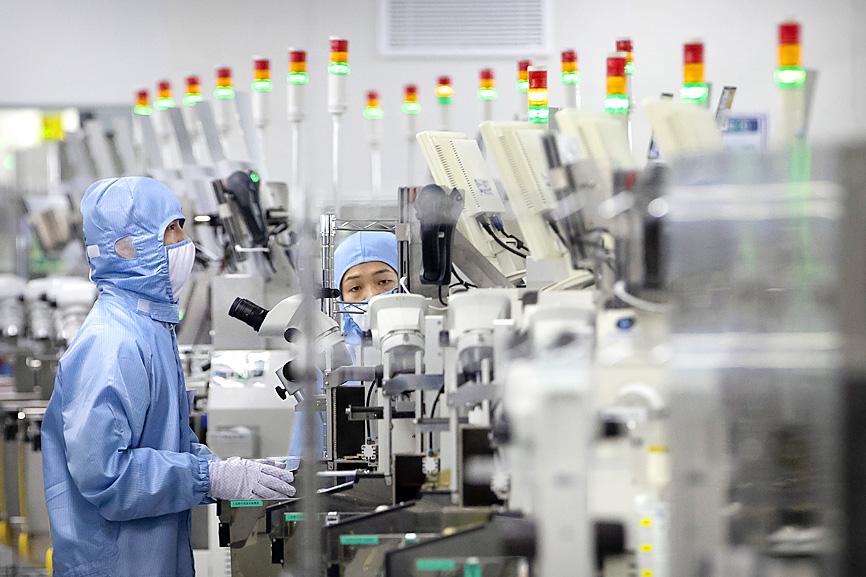China yesterday announced tax breaks to spur growth of its semiconductor industry following US sanctions that alarmed the Chinese Communist Party by cutting off access to US processor chips for tech giant Huawei Technologies Co (華為) and some other companies.
Leaders declared accelerating efforts to transform China into a self-reliant “technology power” to be this year’s top economic priority after the tariff dispute with Washington highlighted its reliance on US components for smartphones and other industries Beijing wants to develop.
Chipmakers can import machinery and raw materials tax-free through 2030, the Chinese ministry of Finance and other agencies announced.

Photo: AP
It did not say how large a subsidy to manufacturers that might represent.
Beijing has spent heavily over the past two decades to build up a Chinese chip industry, but its makers of smartphones and other technology still rely on Taiwan, Europe and the US for their most advanced components.
Then-US president Donald Trump cut off Huawei’s access to US processor chips and other technology in 2019 in a fight over Beijing’s industrial ambitions.
Last year, Trump tightened curbs by prohibiting global suppliers from using US technology to make chips for Huawei. That threatens to cripple the firm’s smartphone business, which was the No. 1 global seller early last year, but has dropped out of the top five brands.
Political analysts expect little change in position under US President Joe Biden.
Huawei founder and chief executive officer Ren Zhengfei (任正非) said in February that it is “very unlikely” sanctions will be lifted.
Processor chips and other semiconductors are China’s biggest single import, totaling more than US$300 billion a year.
Under the latest measure, machinery and raw materials “that cannot be produced or whose performance cannot meet demand” would be exempt from import tax, the government said.
That applies to photoresists, masks, polishing pads and liquids, silicon crystals and wafers, materials to build clean rooms and other production equipment, it said.

China’s Huawei Technologies Co (華為) plans to start mass-producing its most advanced artificial intelligence (AI) chip in the first quarter of next year, even as it struggles to make enough chips due to US restrictions, two people familiar with the matter said. The telecoms conglomerate has sent samples of the Ascend 910C — its newest chip, meant to rival those made by US chipmaker Nvidia Corp — to some technology firms and started taking orders, the sources told Reuters. The 910C is being made by top Chinese contract chipmaker Semiconductor Manufacturing International Corp (SMIC, 中芯) on its N+2 process, but a lack

NVIDIA PLATFORM: Hon Hai’s Mexican facility is to begin production early next year and a Taiwan site is to enter production next month, Nvidia wrote on its blog Hon Hai Precision Industry Co (鴻海精密), the world’s biggest electronics manufacturer, yesterday said it is expanding production capacity of artificial intelligence (AI) servers based on Nvidia Corp’s Blackwell chips in Taiwan, the US and Mexico to cope with rising demand. Hon Hai’s new AI-enabled factories are to use Nvidia’s Omnivores platform to create 3D digital twins to plan and simulate automated production lines at a factory in Hsinchu, the company said in a statement. Nvidia’s Omnivores platform is for developing industrial AI simulation applications and helps bring facilities online faster. Hon Hai’s Mexican facility is to begin production early next year and the

AVIATION BOOM: CAL is to renew its passenger and cargo fleets starting next year on record profits as aviation continues to return to pre-pandemic levels China Airlines Ltd (CAL, 中華航空) yesterday said it is optimistic about next year’s business outlook, as the airline continues to renew its fleet on expectations that global passenger traffic would maintain steady growth and air cargo demand would remain strong. From next year to 2028, the airline is to welcome a new Boeing Co 787 fleet — 18 787-9 and six 787-10 passenger aircraft — to cover regional and medium to long-haul destinations, CAL chairman Hsieh Shih-chien (謝世謙) said at an investors’ conference in Taipei. The airline would also continue to introduce Airbus SE 321neo passenger planes and Boeing 777F cargo jets,

Who would not want a social media audience that grows without new content? During the three years she paused production of her short do-it-yourself (DIY) farmer’s lifestyle videos, Chinese vlogger Li Ziqi (李子柒), 34, has seen her YouTube subscribers increase to 20.2 million from about 14 million. While YouTube is banned in China, her fan base there — although not the size of YouTube’s MrBeast, who has 330 million subscribers — is close to 100 million across the country’s social media platforms Douyin (抖音), Sina Weibo (新浪微博) and Xiaohongshu (小紅書). When Li finally released new videos last week — ending what has